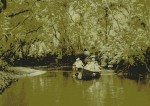
A Western Carolina University student recently helped a retired educator and British World War II veteran prepare memories of canoe trips in the south Florida wilderness during the 1950s for inclusion in a museum archive.
As part of an internship for WCU’s professional writing program, WCU student Amanda Candler digitized, compiled and formatted a collection of Robbinsville resident Paul Fransella’s written memories and photographs for “South Florida Wilderness Canoe Trips 1950-1960.” The memoir is now part of the Historical Museum of Southern Florida’s records, and Fransella and other contributors will be honored at a March 20 reception in Florida.
“Readers should know what the Everglades were like in the 1950s, the importance of this beautiful place and how one has to protect the environment in which they live,” said Fransella.
In the 1950s, Fransella and friends would paddle into the wilderness, spotting alligators and seabirds such as flamingos, pelicans and ibis. Along the way, they met people including a hermit who hunted alligators and discovered ancient shell mounds up to 20 feet high above the Turner River. On two of their trips they saw a Florida panther, thought at the time to be near extinction. Today, much of the wilderness the group explored has been preserved and protected through the establishment of Everglades National Park.
“We were all World War II veterans with regular Monday-through-Friday desk jobs, and so we just wanted to have a challenging outdoor trip together at least once a year in the remotest areas we could find in central and south Florida,” said Fransella, who worked in the finance and insurance industry before refocusing his career on education and humanitarian efforts. His experiences include serving as an associate professor at Florida Atlantic University; a teacher in public and parochial schools on both sides of the Atlantic Ocean; the founder of the Greun Madainn Foundation and Love for Life Camps; and public relations coordinator and South and Central America representative for the World Association for Orphans and Abandoned Children.
Fransella began writing his memories of the canoe trips at the request of a member of the family of the late Bill Whitman, who joined Fransella, John Moynahan and Taylor Larimore on the expeditions. Whitman, whose family built such Florida landmarks as Bal Harbour Shops, was renowned for popularizing Hawaiian-style surfing in Florida using handmade,12-foot-long wooden boards; inventing an underwater camera used to capture footage later incorporated in an Oscar-winning documentary “The Sea Around Us”; and introducing hundreds of varieties of tropical fruits to the Untied States. In addition, Whitman donated millions of dollars to organizations including the Fairchild Tropical Botanic Garden. Many of the Whitman family achievements are documented at the Whitman Family Museum, which is associated with the Historical Museum of South Florida, where Fransella’s memoir now resides.
Rebecca Smith, curator of research materials at the museum, said the institution can never get enough of the type of documents that Fransella shared. “We are happy that this memoir was given to us, and we certainly appreciate it,” said Smith. “It is important to have records like these that show people interacting with our natural environment. For museum collections, donations from the public are especially important because it is how we grow.”
Fransella sought assistance on the memoir project from WCU upon the recommendation of Joan MacNeill, a friend and a member of the WCU board of trustees. Students at WCU seek community service-learning projects that enable them to apply what they are learning in the classroom to benefit the community. Deidre Elliott, director of WCU’s professional writing internship program, connected Fransella to Candler.
“I couldn’t have done it without Amanda,” said Fransella. “She would insert my written memories on her computer and help me choose the best formal layout for my book. We usually met in Bryson City or Sylva over coffee or over lunch.”
For Candler, the internship not only entailed working with Fransella’s written accounts of the trips, but also editing, duplicating and resizing photographs, charts and maps.
“I was able to step into someone else’s world away from the safety of my own,” said Candler, who graduated in December. “This internship helped me validate my degree of choice, as I want to be a writer. It reassured me that work was out there, and I used what I had learned, doing what I love to do.”






